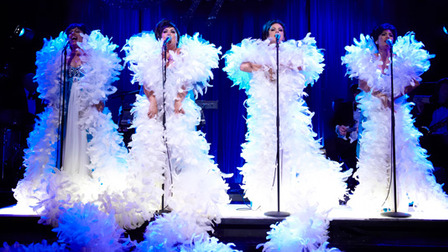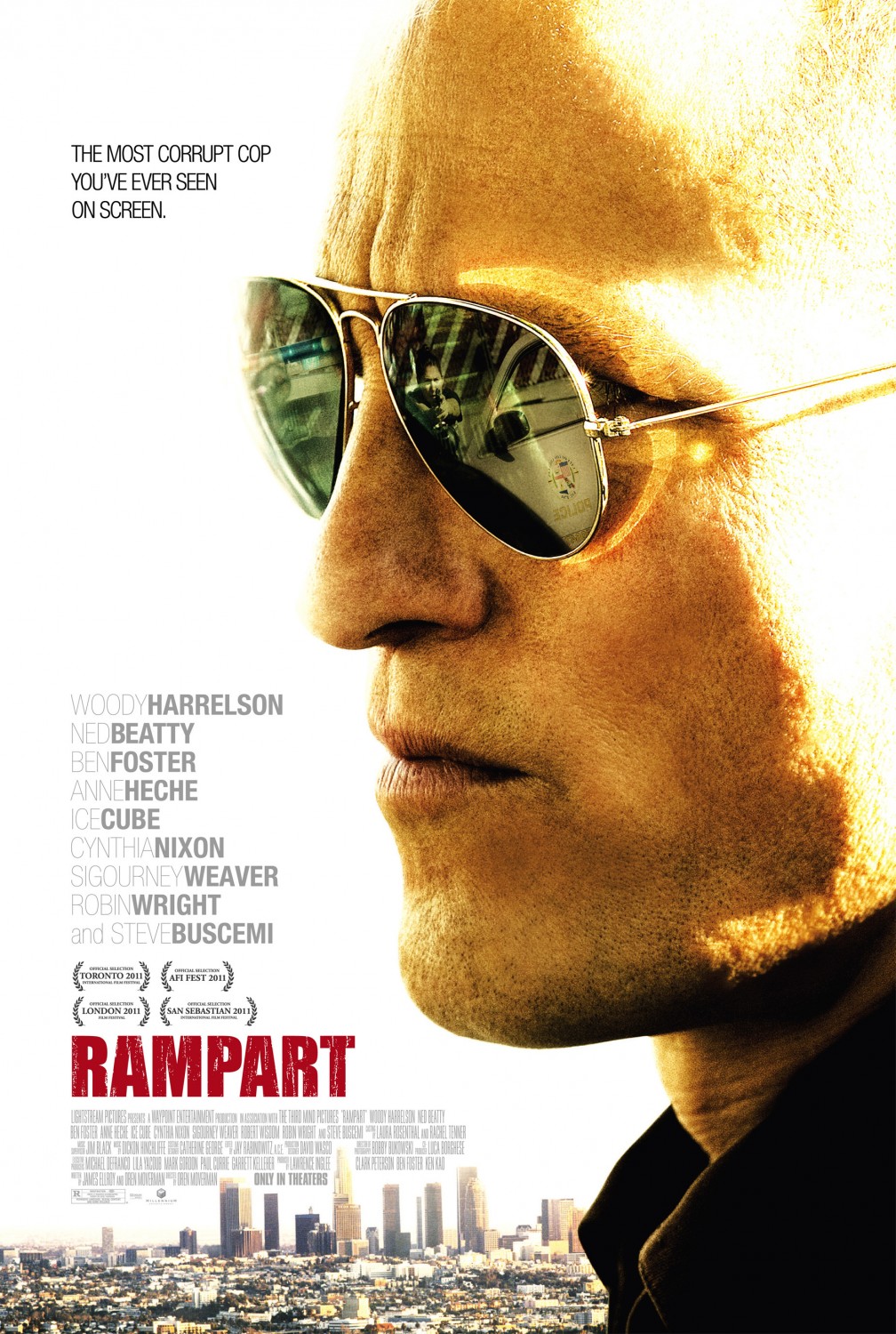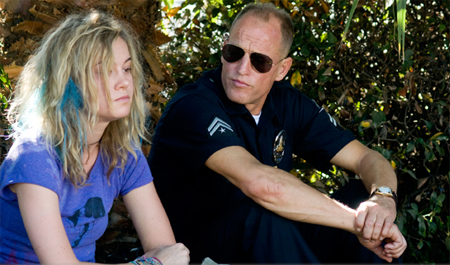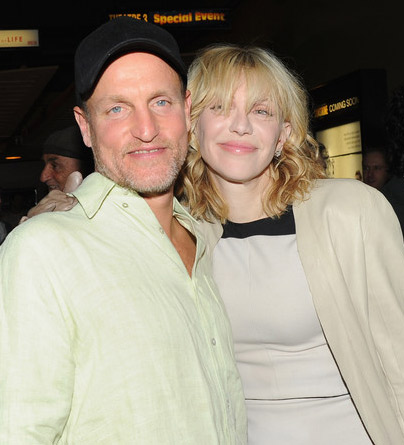 Ben Foster photographed at Sundance in January.Ben Foster doesn't like to talk about himself. This becomes clear immediately after we've begun talking about Ben Foster, though he won't admit it until we're wrapping up.
Ben Foster photographed at Sundance in January.Ben Foster doesn't like to talk about himself. This becomes clear immediately after we've begun talking about Ben Foster, though he won't admit it until we're wrapping up.
"Press is very difficult for me," He explains fifteen into our conversation. Some actors do like talking about themselves, I remind him, amiably. "That must be nice for them," Foster quips back sarcastically. On the subject of Rampart and its leading man Woody Harrelson, though, he is much more effusive. "It's so easy to talk about him." the actor says with relief, combining his roles as co-star, friend and first time producer.
"I'm absolutely amazed by the work he did," he offers when the subject of Woody's acclaimed and Oscar buzzing performance as a corrupt cop pops up. "He dropped 30 lbs, he was living the cop lifestyle, he disappeared on set - it was disturbing quite often to see your friend coming unglued. We all know that it's for a movie but there are those moments where you get a bit concerned... that's just a tribute to what a brilliant actor Woody is."
The two actors co-starred previously in Oren Moverman's The Messenger (2008) which netted both Moverman and Harrelson Oscar nominations. They've since formed a production company with more projects currently in development.
 Foster as "General Terry" informs for corrupt cop "David Brown" (Woody Harrelson) in Rampart
Foster as "General Terry" informs for corrupt cop "David Brown" (Woody Harrelson) in Rampart
What's it like to wear a new hat suddenly as a producer? Foster likens it to "going into the boiler room" to understand the whole mechanism operates. "I've been doing this for 18 years so to be let in on all the almost disasters that come up every single day was actually thrilling. Actors are so insulated and spoiled on set. It's amazing how much they're protected... and need to be to some degree."
Foster was on set nearly every day but for the week preparing for his small role in the film. He praises Moverman's sets for being collaborative, creative and safe for the actors. The Rampart screenplay was initially much broader, closer to co-writer James Ellroy's traditional pulp noir before Moverman's rewrites. And there's no rehearsal -- some actors don't even meet before the first take.
 'No rehearsal?' I ask in disbelief considering the nuanced work Moverman pulls from actors in both Rampart and The Messenger. How else do you get a scene like my favorite in The Messenger, one long continuous shot were Foster and the newly widowed army wife played by Samantha Morton (Foster calls her "an exquisite actor and beautiful human being") become emotionally intimate in her kitchen; Moverman used their first take.
'No rehearsal?' I ask in disbelief considering the nuanced work Moverman pulls from actors in both Rampart and The Messenger. How else do you get a scene like my favorite in The Messenger, one long continuous shot were Foster and the newly widowed army wife played by Samantha Morton (Foster calls her "an exquisite actor and beautiful human being") become emotionally intimate in her kitchen; Moverman used their first take.
"Well, rehearsal is a big word," Foster clarifies, explaining that they don't do much in the way of the traditional theatrical approach of hitting your marks hard. On Moverman's set there are handheld cameras and actors are encouraged to drop lines if they feel they should or move around as they wish, even free to leave the room. All of this adds to an environment that demands that the actors really listen to each other while performing. The rehearsal, such as it is, is not the traditional kind. "Oren does extensive work with each actor building the characters, their past where they're going, who they are, what they do and then sitting them up with a specialist -- someone who has a job similar to that and who has lived a life similar to the character -- and then you [as an actor] do your homework. That's kind of the miracle of good casting that these people know how to listen and know how to play."
 Woody & Ben at the Academy's Governor's Ball earlier this month.On the subject of casting, he sounds a bit like a producer already. So one has to wonder what he thinks of his own typecasting these days. If filmmakers are looking for a dark, twisted, maybe violent character, Foster's name always seems to crop up. Why is that? His succinct answer:
Woody & Ben at the Academy's Governor's Ball earlier this month.On the subject of casting, he sounds a bit like a producer already. So one has to wonder what he thinks of his own typecasting these days. If filmmakers are looking for a dark, twisted, maybe violent character, Foster's name always seems to crop up. Why is that? His succinct answer:
I don't know. I don't know. I'm dying for a musical comedy right about now!"
Musical comedy is actually where it began for Foster, though that seems radically against type for the actor as we know him now. He was doing middle school musicals in Iowa when his father taped him just "just being a goof" Disney got a hold off the tape and the next thing he knew he was in California auditioning and moving to Toronto to star in a television series. "I didn't even know what a mark was." Foster recalls, confessing that he learned everything on the job.
Despite his urge to mix things up with something lighter, Foster admits that he "takes great pleasure in the intense and disturbed". Even his fall back term of endearment fits with his dark persona; the word "beast" keeps peppering his conversation. He uses it to describe talented actors and director's he'd like to work with: David Lynch, Paul Thomas Anderson, Gaspar Noe... "Lars von Trier for sure. There's some real beasts out there." He'd just seen Melancholia before our conversation. Did he always know that his Get Over It (2001) co-star Kirsten Dunst had this kind of work in her?
 Ben Foster and Kirsten Dunst in "Get Over It" (2001)
Ben Foster and Kirsten Dunst in "Get Over It" (2001)
"Oh she is a beast of an actor, always has been." he says, suddenly animated, always happier to praise other actors and avoid the Ben Foster topic. "It's just about the stars aligning for her to really show what she's got. There's so much more to come with her. I'm absolutely a silly fan of Kirsten's."
Before our conversation wraps up he describes Melancholia as a knockout. "Few films have made me happier than Melancholia" he adds with endearing absurd sincerity. It's a beast of a movie, we heartily agree, but apocalypse-induced euphoria might not be the best thing to admit while searching for a good musical comedy.

Related Posts
Interview Kirsten Dunst | TIFF Rampart Review | Rampart After Party | Best Actor Oscar Race | Take Three: Ben Foster
 Friday, August 3, 2012 at 9:12AM
Friday, August 3, 2012 at 9:12AM  [Editor's Note: Glenn of Stale Popcorn fame, pictured left, will be covering the Melbourne International Film Festival for us. Yay! He'll hit titles we're interested in because we've definitely perused his plans. -Nathaniel]
[Editor's Note: Glenn of Stale Popcorn fame, pictured left, will be covering the Melbourne International Film Festival for us. Yay! He'll hit titles we're interested in because we've definitely perused his plans. -Nathaniel]












